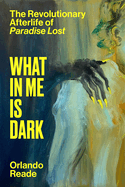
What in Me Is Dark: The Revolutionary Afterlife of Paradise Lost by Orlando Reade is a revelatory examination of the political significance of John Milton's epic poem, reaching back to its origins in the 17th-century English Civil War and pursuing it into 21st-century prison classrooms.
Reade, an assistant professor of English at Northeastern University London, included Paradise Lost in a class he taught in a New Jersey prison while completing his doctorate. His students' "respectful but not reverential" reaction gave him a fresh perspective on how to read Milton not only in the context of modern life but also in the context of Milton's, whose understanding of charity required advocating for self-determination in the face of "state religion, censorship, [and] monarchy."
After providing an overview of Paradise Lost's genesis, Reade delivers an accessible, engaging accounting of what it has meant to 12 readers ("or groups of readers," in one case), including Malcolm X, Thomas Jefferson, and Hannah Arendt. In the 18th century, revolutions in the American colonies, France, and Haiti produced writings that echoed the arguments of Milton's devils against tyranny, while others used the imagery of Satan's forces to represent their colonizers. These contradictions continue through the centuries as Reade offers examples of how radicals, reactionaries, liberals, and conservatives have made Milton's epic their own.
While some general knowledge of Paradise Lost may increase the likelihood of readers picking up this book, Reade explains and quotes from enough of the poem that previous expertise is not necessary to enjoy his work. With Reade's patient guidance, readers will come to appreciate its relevance for their lives as well. --Kristen Allen-Vogel, information services librarian at Dayton Metro Library

